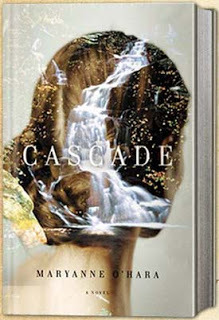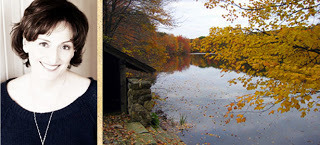Maryanne O'Hara talks about Cascade, her prickly (and wonderful) heroine), obsessions, and so much, much more
I reviewed Maryanne O'Hara's eerie and unsettling Cascade for the Boston Globe, and it quickly became one of my favorite novels. Both a People and Library Journal Pick, it's been justifiably collecting high praise. For weeks after reading the novel, the image of a drowned city kept swimming in my mind, and I was anxious to have Maryanne on my blog. I'm thrilled and honored that she agreed. Thank you, Maryanne.


Where did you get the idea for Cascade? What was the research like? You've said you worked on the book for many years--what was that whole process like? Did you ever lose faith?Cascade developed from a few short story ideas I had—about artists in the 1930s, about the drowned town setting. I had no real desire to write a novel, so in the early days, it was easy to continue to write short stories while I immersed myself in the novel’s research. There was so much to study: the Great Depression, New York City during the New Deal era, art in Paris in the 1920s, art in New York in the 1930s, politics, reservoir construction, the build-up to World War II, theater production, Shakespeare’s First Folio. I watched hours of newsreels. I read old newspapers and magazines. When even my oldest, classically-trained artist friend wasn’t quite sure how paintings were painted in the 1930s, I hit upon the idea of reading “how to” art books published before 1935.I did always have this tiny nugget of faith that the book would someday be published, however humbly, but many times I doubted that faith, if that makes sense. And the doubt was like a trap door flying open. I don’t know where I would have gone, mentally, if I had tried everything and failed to publish Cascade. I did not want to have a “drawer novel.” I put too many years into it.What impressed me so much about the novel was how things were never quite what they seemed. What's your process like? Do you outline things in advance or were there real surprises for you? (Or course there are always surprises but you know what I mean.)No, I don’t outline in advance and I think that’s why it takes me so long to get my stories right. I experience a lot of backtracking, changing direction, exploring—yes, lots of surprises. Once I’ve got the plot/narrative set, I’m good, but my first drafts are not pretty. The initial struggle, for me, is to set down a strong enough narrative that will make a reader want to turn the pages, but the real joy of writing begins with revision. That is when I write for the close reader, the one who will notice the layers and subtle references, and hear the rhythm of the language. That kind of polishing takes time. It’s all about going deeper and revising, revising, revising.I do always comfort myself with the knowledge that if I close my eyes and imagine what would REALLY happen, I will write truth. And truth isn’t generally melodramatics, or a happy ending. As you know yourself.I also deeply admired the character of Dez. She's prickly, opinionated, and she doesn't always do what is right, yet you can't help caring about her deeply. Can you talk a bit about this?Dez was so hard to write! In the early drafts, people didn’t like her at all, and I didn’t understand why. It was as if they were saying they didn’t like my daughter. They said she was too self-centered, too callous, even though I certainly didn’t intend that, and wondered why they couldn’t see her wholeness. But originally I’d written the first drafts in first-person, present tense. When I realized that this general dislike of Dez existed across the board with readers I respected, I rewrote the entire manuscript in third-person past tense, and that turned out to be the key. Third-person was remarkably freeing. I was able to be more objective, and figure out how to convey her complexity and goodness and decency. She finally came fully alive in the way that I had originally intended. I’m finding, not surprisingly, that some readers love her, and some don’t quite like her, but they all agree that she’s human, and that they can understand her.What's obsessing you now and why?Ooh, I’m always obsessing about something. I have always had an obsession about the mystery of our existence within time, which certainly is part of Cascade. The next novel is a story of two love triangles, past and present. The story meditates on time and memory and the secrets people keep, and how, while keeping them, there is often a desire to reveal those secrets, or leave clues that someone can unravel after they are gone. I wrote a short story, "Beyond the Border of Love," that dealt with this idea. But the novel is an entirely new cast of characters, set within a broader context, and moves back in forth in time between the present day and 1960s Prague.What question should I be mortified that I forgot to ask?Well, I’d love to answer this: What has been best about seeing Cascade in print?I had no idea how much I would adore hearing from readers. I love hearing “I couldn’t put it down” and “It gave me a lot to think about.” Just like in the book, the drowned town idea is connecting with people everywhere, and I’m not surprised. Drowned towns happened everywhere—all over the country, all over the world.As for Dez, so many men and women are saying they can relate to her struggle, and I’ve experienced a poignant thing, a couple of older women who have leaned in close to whisper, “I always wondered what would have happened if I had left.”In a feature that the Boston Globe wrote, the reporter mentioned how I’d said that from the very beginning, I’d had a Seamus Heaney line running through my head as I wrote Cascade: You lose more of yourself than you redeem/Doing the decent thingI had quite a few men remark on that line. They said it hit them hard.I liked hearing that. Because I want them to know that Cascade explores, "What is a right choice?" "And who decides what is right?"One of my favorite of my own short stories, "Ocean City," is a man’s story. And the new novel has a male main character. I think it’s hard to be a man in our culture, and I want to write about that.Watch the beautiful Cascade BOOK TRAILER:
http://www.maryanneohara.com/cascade-trailer/
Published on September 24, 2012 07:48
date newest »
newest »
 newest »
newest »




The second I read your the words "her prickly (and wonderful) (heroine), I was hooked!
I'd passed by "Cascade" but wasn't very interested until this interview. You brought out everything that is missing in the reviews that people typically write today. I love learning each author's "truth" from which everything flows and evolves in the writing of their books. You brought Maryanne O'Hara's "truth" out so elegantly and deftly. Thank you. I'm so excited!
The research O'Hara did is the stuff of magic to me. She hit on a pot full of ingredients that I can't live without...
Loved your questions that led to this answer that I love from MaryAnne O'hara: "... but the real joy of writing begins with revision.That is when I write for the close reader, the one who will notice the layers and subtle references, and hear the rhythm of the language. That kind of polishing takes time. It’s all about going deeper and revising, revising, revising.I do always comfort myself with the knowledge that if I close my eyes and imagine what would REALLY happen, I will write truth. And truth isn’t generally melodramatics, or a happy ending. As you know yourself."
What a marvelous interview! I felt like I was sitting nest to the two of you while you were having this "conversation." Everything so palpably real and from the gut and soul!
You rock, Caroline Leavitt!
I've been looking for an interesting primary female character. Maybe Dez is that character. I definitely would not have looked into this book if not for your interview, which is exactly what I'm about to do...
Best,
Elizabeth